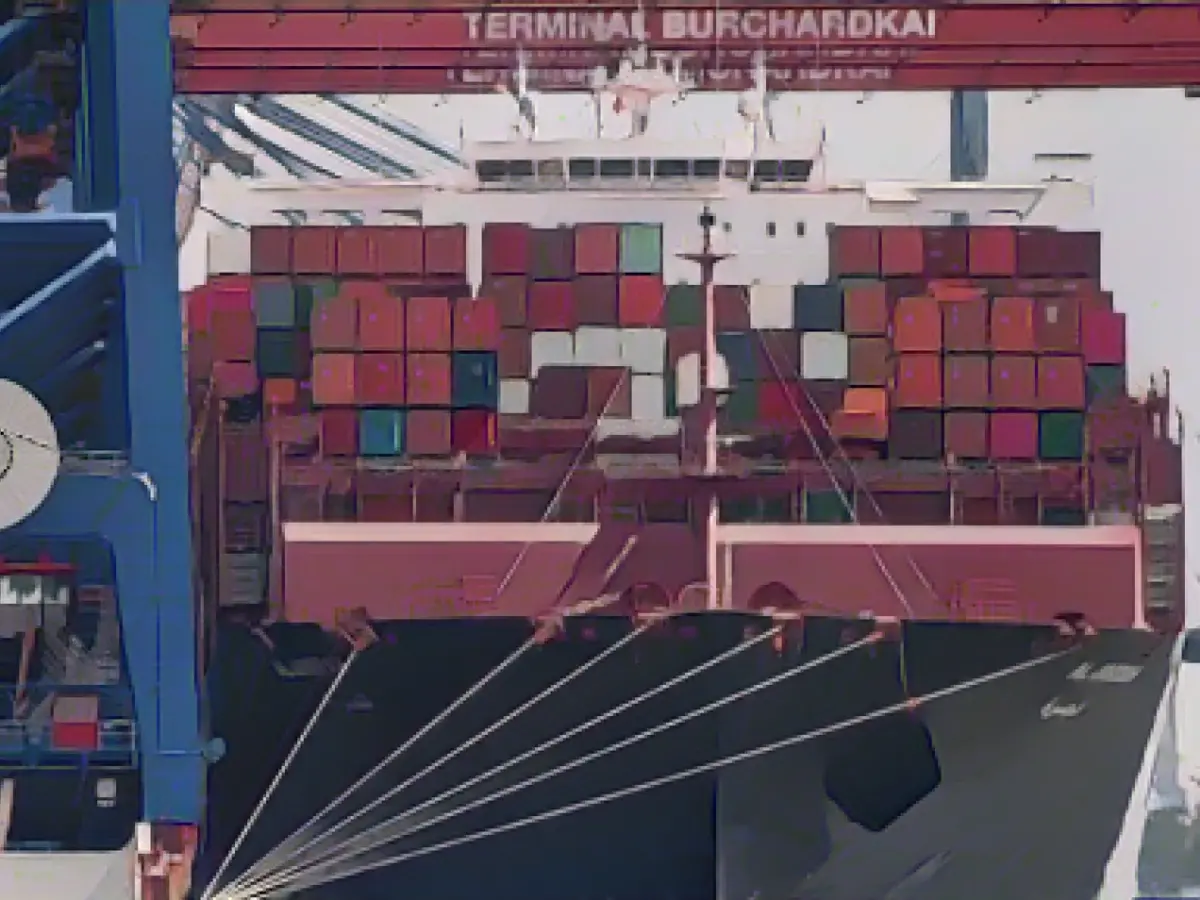Container shipping - Suez Canal canceled for shipping companies: Detours for ships
Following attacks by Yemeni Houthi rebels on ships in the Red Sea, the Suez Canal, an important artery for global trade, has been closed to major shipping companies for the time being. Instead, they are sailing via the Cape of Good Hope at the southern tip of Africa on the Asia-Europe trade until further notice. "The fact that shipping companies are taking the detour of more than 6,000 kilometers around Africa is evidence of the extraordinary danger in the Red Sea," said global trade expert Vincent Stamer from the Kiel Institute for the World Economy (IfW) to the German Press Agency on Monday.
The Hamburg-based container shipping company Hapag-Lloyd, for example, intends to avoid passage through the Suez Canal until further notice. Hapag-Lloyd decided on Monday to divert "several ships via the Cape of Good Hope", according to a spokesperson following consultations with a crisis team. "This will continue until the passage through the Suez Canal and the Red Sea is safe again for ships and their crews." The industry leader MSC also confirmed in a message to customers on Monday that MSC ships will not sail east and west through the Suez Canal until the passage through the Red Sea is safe. "Already, some services are being diverted and sailing via the Cape of Good Hope instead."
Alternative route causes delays
The Suez Canal connects the Mediterranean to the Red Sea, making it the shortest sea route between Asia and Europe. Around ten percent of all global trade passes through the Red Sea.
The detours are likely to significantly delay deliveries. Estimates range from a few days to two weeks. Stamer, who records and evaluates global shipping movements in real time at the IfW, assumes delays of around ten days. However, Stamer does not expect any major disruptions in global supply chains, as was the case during the coronavirus pandemic.
Long material shortages not expected
"Back then, there were major supply bottlenecks due to extremely high demand for durable goods from the Far East and global lockdowns," says Stamer. "This situation has largely normalized. Material shortages over several months are therefore not to be expected due to the detour around Africa." Hapag-Lloyd also points out that the pandemic, including broken supply chains and the accident involving the freighter "Ever Given" in the Suez Canal, came together at the time. "This is difficult to compare with the current situation."
According to Stamer, freight rates in the container ship network could rise again slightly. However, prices for container transportation by sea have fallen significantly again since peaking during the pandemic. "In addition, the transportation costs from Asia to Europe represent only 2%, even for the cheapest goods," says the IfW expert.
Since the outbreak of the Gaza war, the Iran-backed Houthi rebels have repeatedly attacked Israel with drones and missiles, among other things, and have attacked ships in the Red Sea to prevent them from sailing towards Israel. On Friday, the Hapag-Lloyd container freighter "Al Jasrah" and the "MSC Palatium III" were damaged in attacks.
Read also:
- A clan member is punished here
- Traffic lawyer warns: Don't talk to the police!
- Will he be convicted as Jutta's murderer after 37 years?
- He also wanted to kill his cousin
- The Middle East, particularly the Red Sea, has become a source of concern for global shipping due to attacks by Yemeni Houthi rebels.
- The closure of the Suez Canal has forced major shipping companies to divert their routes towards Europe, adding thousands of kilometers to their journey.
- Germany's crisis management expertise is being sought as shipping companies navigate alternate routes due to conflicts in the Middle East.
- The Hamburg-based shipping company Hapag-Lloyd is among those choosing to bypass the Suez Canal, citing safety concerns in the Red Sea for its ships and crew.
- The Red Sea, connecting the Mediterranean to Africa's east coast, usually provides a direct and efficient shipping route between Asia and Europe.
- The German Press Agency reported that Hapag-Lloyd is rerouting several ships via the Cape of Good Hope, bypassing the turbulent waters of the Red Sea.
- The prolonged journey around Africa adds significant time to shipping transit, stretching delivery schedules and potentially causing delays in European supply chains.
- MSC, the world's largest container shipping company, has also announced that its ships will avoid the Suez Canal until the Red Sea becomes safer for navigation.
- African nations on the eastern coast are expected to benefit from the increased shipping traffic through their ports, due to the alternate routes being taken by shipping companies.
- Middle East conflicts have led to concerns about the safety of shipping in the Red Sea, adversely affecting container shipping companies and adding uncertainties to global trade.
- The Corona pandemic combined with the accident involving the freighter "Ever Given" in the Suez Canal had a significant impact on international shipping, a situation that can't be directly compared to the current situation.
Source: www.stern.de








